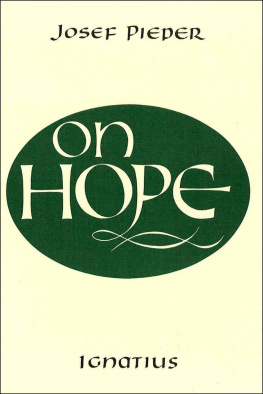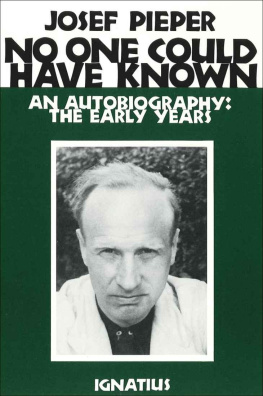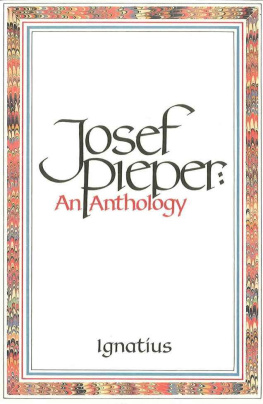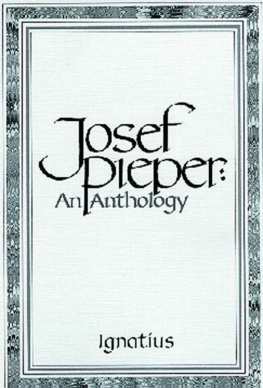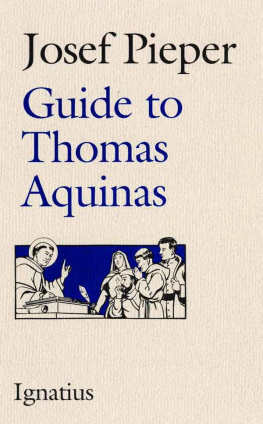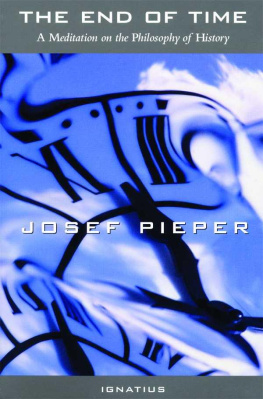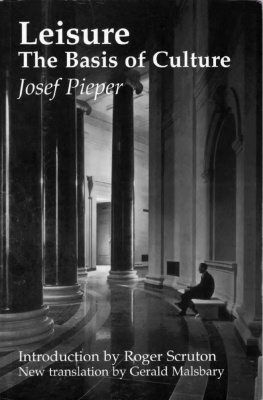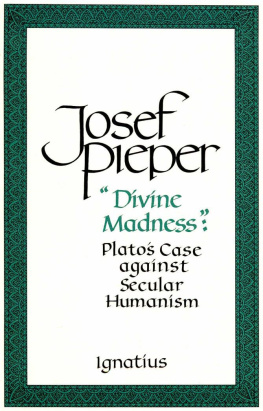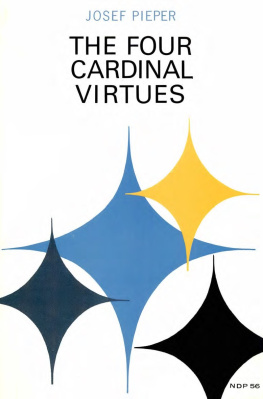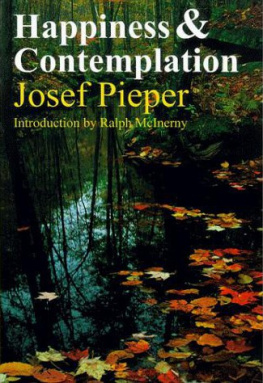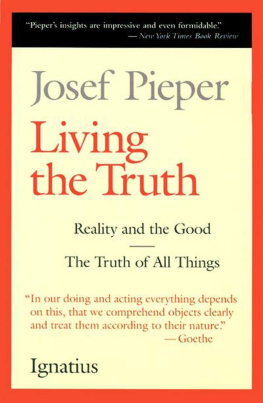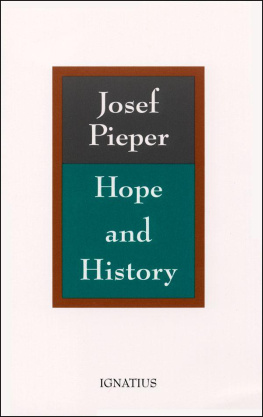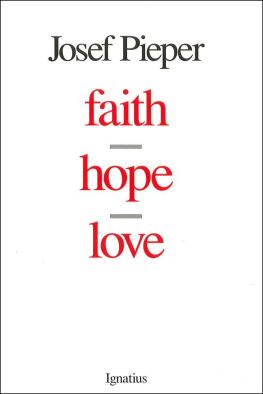Josef Pieper - On Hope
Here you can read online Josef Pieper - On Hope full text of the book (entire story) in english for free. Download pdf and epub, get meaning, cover and reviews about this ebook. year: 0, genre: Religion. Description of the work, (preface) as well as reviews are available. Best literature library LitArk.com created for fans of good reading and offers a wide selection of genres:
Romance novel
Science fiction
Adventure
Detective
Science
History
Home and family
Prose
Art
Politics
Computer
Non-fiction
Religion
Business
Children
Humor
Choose a favorite category and find really read worthwhile books. Enjoy immersion in the world of imagination, feel the emotions of the characters or learn something new for yourself, make an fascinating discovery.
- Book:On Hope
- Author:
- Genre:
- Year:0
- Rating:4 / 5
- Favourites:Add to favourites
- Your mark:
- 80
- 1
- 2
- 3
- 4
- 5
On Hope: summary, description and annotation
We offer to read an annotation, description, summary or preface (depends on what the author of the book "On Hope" wrote himself). If you haven't found the necessary information about the book — write in the comments, we will try to find it.
On Hope — read online for free the complete book (whole text) full work
Below is the text of the book, divided by pages. System saving the place of the last page read, allows you to conveniently read the book "On Hope" online for free, without having to search again every time where you left off. Put a bookmark, and you can go to the page where you finished reading at any time.
Font size:
Interval:
Bookmark:
ON HOPE
JOSEF PIEPER
ON HOPE
TRANSLATED BY
SISTER MARY FRANCES McCARTHY, S.N.D.
IGNATIUS PRESS SAN FRANCISCO
Title of the German original:
ber die Hoffnung
71977 by Ksel-Verlag
GmbH & Co., Mnchen
Cover by Victoria Hoke Lane
1986 Ignatius Press, San Francisco
All rights reserved
ISBN 978-0-89870-067-1
Library of Congress Catalogue Number 85-82177
CONTENTS
Reflections on the concept
status viatoris
Anticipation of nonfulfillment
(despair)
Anticipation of fulfillment
(presumption)
Although he should slay me,
I will trust in him (Job 13:15).
Chapter One
REFLECTIONS ON THE CONCEPT
STATUS VIATORIS
P ASTORAL MELODRAMATICS have robbed the reference to man as a pilgrim on this earth and to his earthly life as a pilgrimage of its original significance and virility as well as its effectiveness. It no longer clearly mirrors the reality it is intended to convey. Its original meaning has been overgrown with a welter of extraneous aesthetic connotations; it has been all but buried under a veil of discordant secondary meanings, the false sentimentality of which actually destroys the joy that contemporary manabove all the younger generation and, perhaps, precisely the best of themwould have experienced in striving toward the reality that is ultimately reflected in the metaphor.
Nevertheless, this reality is part of the very foundation of being in the world for the Christian: the concept of the status viatoris is one of the basic concepts of every Christian rule of life.
To be a viator means one on the way. The status viatoris is, then, the condition or state of being on the way. Its proper antonym is status comprehensoris . One who has comprehended, encompassed, arrived, is no longer a viator , but a comprehensor . Theology has borrowed this word from one of Pauls epistles: Brethren, I do not consider that I have laid hold [ comprehendisse ] of [the goal] already (Phil 3:13). To be on the way, to be a viator , means to be making progress toward eternal happiness; to have encompassed this goal, to be a comprehensor , means to possess beatitude. Beatitude is to be understood primarily as the fulfillment objectively appropriate to our nature, and only secondarily as the subjective response to this fulfillment. And this fulfillment is the Beatific Vision.
The concepts status viatoris and status comprehensoris designate the natural states of being of all creaturesabove all, of man. Nearly every theological statement about men (or angels) refers more or less explicitly to one or the other of these concepts; and it is astonishing how many basic concepts of theology have a meaning in reference to the state of being on the way that is different from their meaning in reference to the state of total possession.
It would be difficult to conceive of another statement that penetrates as deeply into the innermost core of creaturely existence as does the statement that man finds himself, even until the moment of his death, in the status viatoris , in the state of being on the way.
Although it is almost literally as high as heaven above the enlightened despair of secular man, the meaning this statement has acquired in popular pietythat the human soul comes, after the unrest of earthly life, into the peace of its heavenly homeis, nonetheless, but the easily remembered, figurative formulation of a metaphysical concept that is only partly comprehensible to the popular mind, and its clarification of which can lead the human spirit to the deepest knowledge of its own existence.
The state of being on the way is not to be understood in a primary and literal sense as a designation of place. It refers rather to the innermost structure of created nature. It is the inherent not yet of the finite being.
The not yet of the status viatoris includes both a negative and a positive element: the absence of fulfillment and the orientation toward fulfillment.
Fundamental to and constitutive of the negative side of the status viatoris is the proximity to nothingness that is the very nature of created tilings. The creatures relationship to nothingness has its roots in the primordial fact that whatever has been created has been created out of nothing. This is evident in the reverse side of human freedom, in the possibility of sinning; for sin is nothing other than a turning aside to nothingness. In the natural course of events, the possibility of sinning cannot be taken from the creature endowed with intelligence; for by the very fact that it stems from nothingness, its power can revert to non-being.
The positive side of the concept of being on the way, the creatures natural orientation toward fulfillment, is revealed, above all, in mans ability to establish, by his own effort, a kind of justifiable claim to the happy outcome of his pilgrimage. This ability is none other than the possibility of meritorious action, which has the character of genuine progress. (This does not alter the fact that meritorious action presumes the pre-existence of something that cannot be merited.) The status comprehensoris fulfills the claim of these merits; in consequence, the possibility of meritorious action ceases to exist just as does the freedom to sin. In the transition from the state of being on the way to that of status comprehensoris , then, status viatoris is dissolved in both its negative and its positive aspects: the possibility of turning toward nothingness is abolished by union; the claim to and the orientation toward fulfillment are abolished by the reality of fulfillment.
The status viatoris comes to an end at the moment when uncertainty comes to border on certainty. This moment puts its seal not only on fulfillment, but also on nonfulfillment. Even the decision in favor of nothingness becomes definitive at this time. The state of being on the way is dissolved in either case; even Satan immediately lost the status viatoris by his sin.
Eternal damnation is the irrevocable fixing of the will on nothingness, just as the status comprehensoris is the confirmatio in bono , the fastening of the will on the highest being. In damnation, the positive side of the status viatoris , the orientation toward fulfillment, is definitively cut off and destroyed; thus isolated, the negative side becomes an absolute value. The inner not yet that once characterized the creatures nature is changed into a characteristic inner not.
The way of man leads to death. Since man, by his sin, came under the law of death at the beginning of his history, his life has become an incipient death. The way of man leads to death as its end, but not as its meaning. The meaning of the status viatoris is the status comprehensoris .
For man, then, the status viatoris lasts as long as he lives in the body; the status viatoris ends when he ceases to live in the body. For that reason, mans way is temporality. Time, in fact, exists only in reference to the transitoriness of man. The union of his spirit with his body is the foundation of his union with time; spirit itself, including mans spirit, is above time.
Present-day existential philosophy, which regards human existence exclusively in its temporality as a being in time, is right to the extent that it opposes an idealistic doctrine of man in which the status viatoris seems transformed, against its nature, into a permanent likeness to God. But to the extent that this existential philosophy conceives of mans existence as essentially and in the foundation of its being temporal (Heidegger), it too fails to comprehend the true nature of its subject. Anyone, in other words, who seeks to understand temporality without restriction as the necessary mark of human existence will find hidden from him not only the life beyond time, but also the very meaning of life in time. Idealism fails to recognize the nature of human existence because it omits the status viatoris ; existentialism fails to recognize the true nature of human existence because it denies the pilgrimage character of the status viatoris , its orientation toward fulfillment beyond time, and hence, in principle, the status viatoris itself.
Next pageFont size:
Interval:
Bookmark:
Similar books «On Hope»
Look at similar books to On Hope. We have selected literature similar in name and meaning in the hope of providing readers with more options to find new, interesting, not yet read works.
Discussion, reviews of the book On Hope and just readers' own opinions. Leave your comments, write what you think about the work, its meaning or the main characters. Specify what exactly you liked and what you didn't like, and why you think so.

